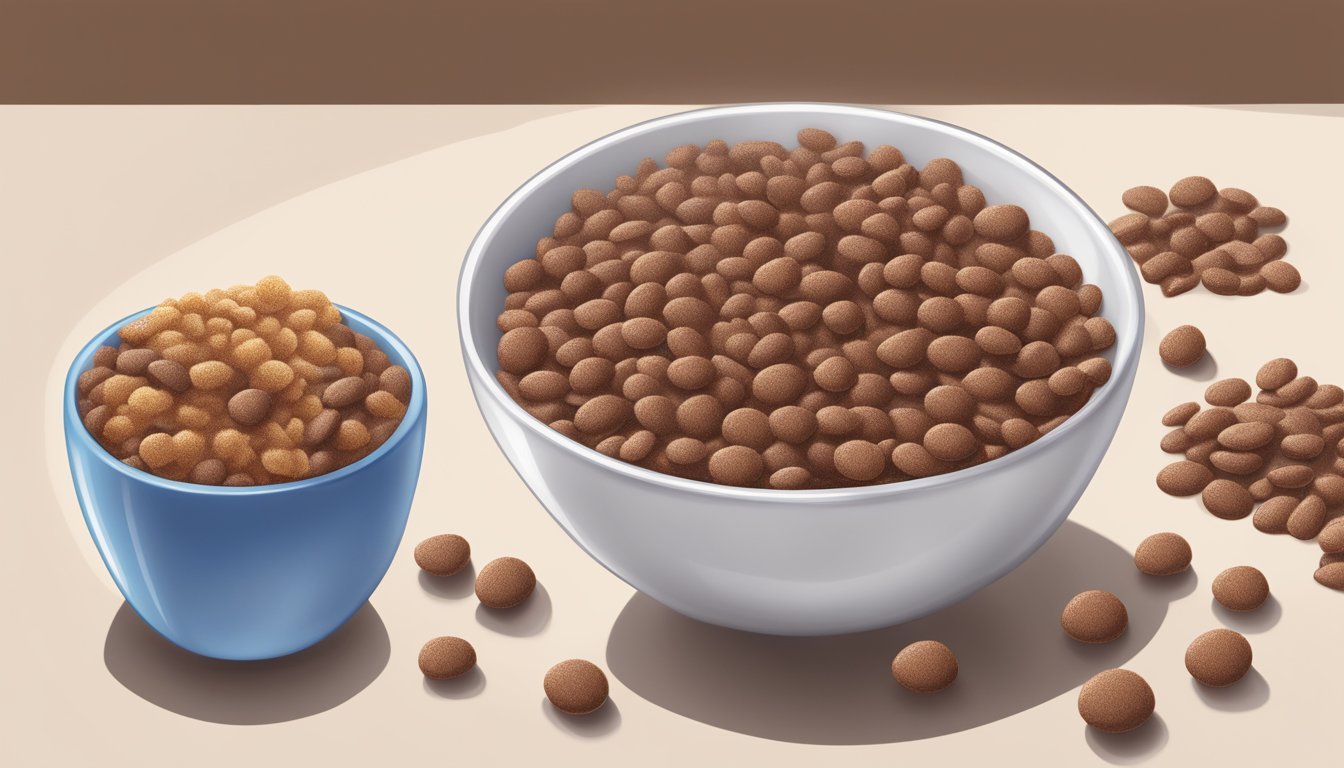Cocoa Pebbles vs Special K
Comparing Nutritional Value and Taste
This Article is Part of Our Breakfast Cereal Guide with Details on Cocoa Pebbles Nutrition and Special K Nutrition
When it comes to breakfast cereals, consumers often find themselves torn between choices that promise both taste and nutritional value. Cocoa Pebbles and Special K stand as starkly different options on the cereal spectrum. Cocoa Pebbles offers a chocolatey delight packed with flavor, while Special K shifts the focus toward a balanced nutrient profile.
Special K boasts higher levels of Vitamin B12, Vitamin B6, Iron, and several other essential vitamins and minerals. This makes it an attractive option for those looking to supplement their diet with essential nutrients. Cocoa Pebbles, on the other hand, might appeal more to those looking for a tasty breakfast treat with its rich chocolate flavor and delightful crunch.
For those prioritizing nutrition over taste, Special K provides a more substantial nutrient coverage, particularly in vitamins and minerals essential for daily health. Conversely, if the goal is to indulge in a sweet, flavorful breakfast, Cocoa Pebbles makes a compelling case with its delicious chocolatey profile.
Overview of Cocoa Pebbles and Special K
Cocoa Pebbles and Special K are both popular breakfast cereals with distinct brand identities and unique consumer bases. Exploring their brand histories and target consumers offers insights into their enduring success.
Brand History and Recognition
Cocoa Pebbles was introduced by Post Consumer Brands in 1971. It quickly became a favorite for its chocolatey flavor and association with the Flintstones characters, which boosted its popularity. Over the years, it has maintained strong brand recognition through consistent marketing and product innovations, such as introducing gluten-free versions.
Special K, a product of Kellogg's, was launched in 1955. Initially marketed as a health-focused cereal, it gained recognition for promoting weight management and healthy eating. Special K has expanded its product line to include various flavors and forms, like bars and shakes, keeping it relevant in the market.
Target Consumer Base
Cocoa Pebbles primarily targets children and families. Its marketing strategies often highlight the fun, flavorful aspects of the cereal, appealing to younger audiences. The inclusion of well-known cartoon characters also caters to nostalgia among parents who grew up enjoying the cereal.
Special K appeals to health-conscious adults, particularly those interested in weight management and overall wellness. Its advertisements focus on nutritional benefits, such as high protein and essential vitamins. The brand emphasizes a balanced diet and active lifestyle, drawing in consumers who prioritize health and fitness.
Nutritional Comparison
When comparing Cocoa Pebbles and Special K, key differences emerge in their caloric content, macronutrient profile, and vitamin and mineral composition.
Caloric Content and Serving Size
Cocoa Pebbles and Special K differ in their caloric content per serving. Cocoa Pebbles offers 140 calories per serving.
Special K, on the other hand, provides slightly more at 150 calories per serving.
Both cereals have modest calorie levels, making them suitable for those monitoring their intake. Serving sizes for both cereals are standardized at about 1 cup, making comparisons straightforward for portion control.
Macronutrient Profile
Analyzing macronutrients, Cocoa Pebbles contains 3 grams of protein, no dietary fiber, and 13 grams of sugar per serving. Special K, compared to Cocoa Pebbles, contains 1 gram of dietary fiber and 7 grams of sugar per serving. It also edges out with more protein at 6 grams per serving.
Fat content shows negligible differences; Cocoa Pebbles has zero saturated fat, and Special K similarly has negligible saturated fat content. When examining carbohydrates, table comparisons highlight:
Cocoa Pebbles Special K Carbohydrates 31g 32g Protein 3g 6g Sugar 13g 7g Fiber 0g 1g
Vitamins and Minerals
Special K excels in its vitamin and mineral content. It provides significantly higher amounts of essential nutrients such as Vitamin B12, Vitamin B6, Iron, Folate, Vitamin C, and Vitamin B1. For instance, Vitamin B12 reaches 592% of the daily need per serving in Special K.
Cocoa Pebbles contains notable amounts of potassium (60mg per serving) and is fortified with other vitamins, but far fewer in quantity compared to Special K. Special K’s superior nutrient profile can especially be seen in:
Cocoa Pebbles Special K Vitamin B12 0.6mcg 3.6mcg Iron 3.6mg 11.2mg Sodium 220mg 230mg Potassium 60mg 170mg Vitamin C 0mg 40mg
Nutritional needs and dietary goals vary, making either cereal a viable choice depending on individual health priorities.
Flavor Profiles and Varieties
Cocoa Pebbles and Special K Chocolatey Delight each offer distinct flavors and textures. These differences play a central role in their appeal to different types of cereal enthusiasts.
Taste and Texture
Cocoa Pebbles feature rich chocolate flavors, delivering a sweet and indulgent experience. The cereal’s rice-based composition provides a light and crisp texture that contrasts well with milk, maintaining its crunch until thoroughly soaked.
Special K Chocolatey Delight, on the other hand, balances sweetness with a more subtle chocolate presence. This cereal combines light, crunchy flakes with chocolate pieces, creating a diverse texture experience. The chocolate pieces add bursts of flavor, while the flakes provide a less overpowering, steady crunch.
Both cereals offer unique textures and flavor experiences tailored to different preferences.
Different Flavors Available
Cocoa Pebbles are primarily known for their classic chocolate flavor, which has remained largely unchanged. Their focus is on delivering a consistent chocolate experience.
Special K offers a broader range of flavors beyond just Chocolatey Delight. Options include Red Berries, Vanilla Almond, and Honey Oat. These variations allow consumers to choose from a wider palette of tastes while maintaining the signature crunch of Special K flakes.
This versatility allows Special K to cater to a broader audience seeking both variety and health benefits in their cereal. Cocoa Pebbles, meanwhile, cater to those who prefer a straightforward, chocolate-centric cereal experience.
Health and Diet Considerations
Choosing between Cocoa Pebbles and Special K involves various considerations, particularly in terms of nutrients, dietary restrictions, and weight management. Here's a closer look at how each cereal fits into specific dietary needs.
Dietary Restrictions Compatibility
Special K is often recognized for its vitamins and minerals. It provides significant amounts of Vitamin B12, B6, Iron, Folate, and Vitamin C. These are crucial for individuals with specific nutrient deficiencies.
Cocoa Pebbles, while also fortified, tends to have higher sugar content. This might be a concern for those on low-sugar diets including diabetics. Additionally, Cocoa Pebbles contains gluten, which might not be suitable for those with gluten intolerance or celiac disease. Special K offers gluten-free options, making it a better choice for those with gluten-related dietary restrictions.
Role in Weight Management and Lifestyle Diets
Special K is frequently included in weight management programs due to its lower calorie content and high vitamin profile. The cereal is marketed as a tool for meal replacement, promoting a controlled caloric intake. An 11.2-ounce box of Special K retails for less than $5, making it an affordable option.
In contrast, Cocoa Pebbles, while delicious, contains 140 calories per serving. It is generally higher in sugar, which can contribute to weight gain if not consumed in moderation. Special K's potential for aiding in weight reduction and promoting a healthy lifestyle makes it a preferable option for those focused on weight management and nutritious breakfast choices.
Both cereals can fit into a balanced diet but are best chosen based on individual nutritional goals and dietary needs.
Market Presence and Consumer Preferences
Cocoa Pebbles and Special K cater to different market segments with distinct consumer preferences. Each brand's market presence reflects a strategic approach to sales and consumer loyalty.
Sales and Popularity Rankings
Cocoa Pebbles, marketed by Post Consumer Brands, has a significant foothold in the children's cereal market. Featuring a chocolatey flavor, it competes directly with other cereals like Cocoa Krispies. Kellogg's Special K, targeting health-conscious adults, competes with cereals like Cheerios and Life.
In recent years, Kellogg's has maintained a strong presence in the cereal market, achieving sales of $13.8 billion. Special K's appeal lies in its nutritional benefits, often leading market rankings in the health cereal category. Conversely, Cocoa Pebbles draws a dedicated fanbase, securing its place among the top chocolate-flavored cereals.
Brand Loyalty and Trends
Consumers of Cocoa Pebbles often exhibit strong brand loyalty, driven by the cereal's nostalgic and consistent flavor profile. This loyalty is reinforced by its playful branding and association with childhood memories. Trends indicate a stable demand despite fluctuations in broader cereal market dynamics.
Special K, however, drives loyalty through health-centric marketing and product innovation. Kellogg's has successfully tapped into trends emphasizing healthier lifestyles, boosting brand loyalty. Special K's ability to adapt to consumer preferences, such as offering variations like Special K Protein and Special K Red Berries, keeps it relevant in a competitive market against brands like General Mills' Cheerios.
Both brands' loyalty indicators reflect their unique market strategies and consumer engagement approaches.
Environmental and Societal Impact
The environmental and societal impact of both Cocoa Pebbles and Special K depends on the sustainability of their ingredients and the corporate responsibility initiatives of their manufacturers, Post and Kellogg's.
Sustainability of Ingredients
Cocoa Pebbles, produced by Post, relies on cocoa, which has a significant environmental footprint. Cocoa farming often leads to deforestation and loss of biodiversity, primarily in West Africa, where 70% of cacao is farmed. Environmental stresses and pests result in high crop losses, which increases the environmental burden.
Conversely, Special K by Kellogg's is mainly composed of rice and wheat. These grains have a lower ecological impact compared to cocoa, but they still require substantial water and land resources. Sustainable farming practices can mitigate these effects, but the supply chain's transparency and reporting are crucial for accountability.
Corporate Responsibility Initiatives
Post has implemented several sustainability initiatives, focusing on reducing plastic packaging and improving the environmental footprint of their supply chain. Efforts include working with cocoa suppliers to encourage sustainable farming practices and providing support to farming communities.
Kellogg's demonstrates a strong commitment to reducing greenhouse gas emissions and improving social conditions for workers in their supply chains. They emphasize transparency and sustainability through their "Better Days" program. This initiative targets reducing hunger, ensuring responsible sourcing, and promoting sustainable agriculture practices across their product lines, including Special K.
Both companies aim to balance profitability with environmental stewardship and social responsibility, although the effectiveness and transparency of these initiatives can vary.






